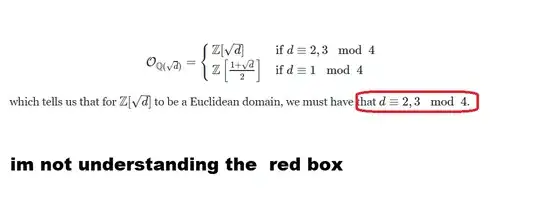i have some confusion not getting in my head
this answer :Euclidean domain $\mathbb{Z}[\sqrt{d}]$
My attempt : if i take $d= 10$ then $\mathbb{Z}[\sqrt 10]$ is not euclidean domain but it satisfied $10 \equiv 2 \mod 4$
similarly if i take $d= 13$ then $\mathbb{Z}[\sqrt 13]$ is euclidean domain but $13 \equiv 1 \mod 4$ which is contradicts to above answer
Im confused why he take $ d \equiv 2, 3 \mod 4 $ is euclidean domain ?
